James Marshall argues that the Sheffield conference of the Labour left faces fundamental choices
The idea of establishing the Labour Left Alliance was first mooted last year. Why? Because of the obvious failure of Momentum. After Jon Lansman – sadly with the blessing of Jeremy Corbyn, John McDonnell and Diane Abbott – had carried out his anti-democratic coup, to all intents and purposes Momentum became the property – the plaything – of just one man.
Consequently, the left of the Labour Party has gropingly, hesitatingly, often falteringly, moved towards some kind of unity. The crucial question, of course, is what sort of unity?
The LLA boasts of having around two thousand signatures to its appeal and a growing list of affiliates and local branches. It is, of course, a work in progress. But it will be the Sheffield conference which will decide the basic character of the organisation. The agenda looks massively overloaded. Nonetheless, we must hope that sufficient time is allotted for serious debate. Without that we will probably get a sad repetition of past dead ends.
Essentially there are two models on offer vis-à-vis the aims and constitution. The first comes under the name of London LLA. It advocates a membership organisation and politics and structures befitting a left opposition in the Labour Party.
The other proposals come from Tees Valley Labour Left, Dulwich Labour Left, and the steering committee of Labour Against the Witchhunt (and Sheffield Labour Left). Differences between Tees, Dulwich and LAW SC/Sheffield are secondary and, from our viewpoint, politically unimportant. They amount to variations on a lowest-common-denominator theme. Unsurprisingly all of them are politically conservative and organisationally mimic the elaborate structures of the Labour Party.
Without doubt, the approach advocated by London is far superior.
Politically it is unashamedly bold. London wants to commit the LLA to “working class rule” and a transition to a stateless, moneyless society based on the celebrated principle, “From each according to their ability, to each according to their need.”
London also recognises the necessity of breaking with capitalism and its ecologically destructive cycle of production for the sake of production. Note, the International Panel on Climate Change warns that we have no more than a couple of decades before the world’s ecosystem experiences a series of devastating “tipping points”.
Unfortunately, the London comrades fluffed one of Marx’s most famous …. and surely urgently relevant conclusions. Hence we have: “1.2. Opposition to capitalism, imperialism, racism, militarism and the ecological degradation of the planet through the ruinous cycle of production for the sake of production or profit.”
There is no problem with opposition to capitalism, imperialism, racism and militarism. It is the “ecological degradation of the planet through the ruinous cycle of production for the sake of production or profit” which constitutes the problem.
Theoretically this formulation is illiterate. Production for the sake of production and profit are split apart, treated separately, counterposed. For the philistine this might amount to just two short words. But that is really, really stupid. It is like saying there is nothing important separating the biblical command “thou shalt not commit adultery” and the command “thou shalt commit adultery”. Only a single word separates the two. But a world of difference.
Marx should be read seriously and treated seriously. In Capital he logically began by defining the commodity. It is a use-value which also has exchange-value. He then painstakingly develops the category of exchange-value and eventually arrives at the equivalent form. Gold becomes money, the universal equivalent. From here he shifts from the formula C-M-C and reverses it with what we know from everyday capitalism: M-C-M.
Yet from the viewpoint of the capitalist this makes no sense whatsoever. Why engage in the trials and tribulations of production, why take the risks of having to find a buyer, when you end up with the same amount of money that you started out with?
No, the capitalist aims to realise a profit: M-C-M’. The capitalist ends with more money than they start with. According to their whims and fancies, the capitalist spends that augmented money on all manner of ‘how to spend it’ luxuries.
However, capitalism consists of many capitals. Competition forces the individual to plough the vast bulk of their profits back into production. Making bigger and bigger profits becomes a necessity in its own right. Production becomes a compulsion, driving the capitalist endlessly forward.
Hence we arrive at this passage in chapter 24:
Accumulate, accumulate! That is Moses and the prophets! … Therefore save, save, ie. reconvert the greatest possible portion of surplus-value, or surplus product into capital! Accumulation for accumulation’s sake, production for production’s sake: by this formula classical political economy expressed the historical mission of the bourgeoisie, and did not for a single instant deceive itself over the birth-throes of wealth.
Making a profit appears perfectly rational. The worker goes to work in order to secure wages, so as to be able to secure the means of subsistence – food, clothing, housing, transport, etc. The capitalist lays out money to hire workers in order to make a profit, with which they are able to purchase luxury food, luxury clothing, luxury housing, luxury transport, etc. It would appear that all their material needs are more than satisfied.
Upon investigation, however, capitalism turns out to have an irrational rationale. Because of competition, the desire to make a profit becomes a necessity which, by its own logic, crashes through every social, every natural barrier. Workers are subject to constant and unremitting attack; their trade unions and political parties are controlled through numerous restrictive laws, neutered through corruption or simply overpowered using brute force.
Nature is pillaged, raped and used as a latrine. Ecological degradation is inevitable.
This has nothing to do with the evil intentions of individual capitalists. Capitalists prove not to be masters of their own system. No, they are merely personifications of capital. The system controls them. As such capitalists are subject to externally imposed laws of accumulation. They are compelled to accumulate for accumulation’s sake.
Clearly, therefore, the London formulation requires a little, but vital, cut.
Theoretically it only makes sense if it reads: “1.2. Opposition to capitalism, imperialism, racism, militarism and the ecological degradation of the planet through the ruinous cycle of production for the sake of production.” Fortunately, a number of comrades have submitted an amendment to that effect.
That problem aside, London understands the necessity of linking the future we strive to achieve with the immediate programme needed to bring it about. The battle for democracy must be won. Abolish the monarchy, the standing army and the House of Lords. Establish a single-chamber parliament and disestablish the Church of England. In the same spirit of extreme democracy London calls for proportional representation and annual elections (one of the central demands of the Chartist movement). In short, the “democratic republic”.
London is no less bold when it comes to the Labour Party. Conference must be sovereign. Labour MPs should no longer be self-serving career politicians. Towards that end, they must only take the average skilled workers’ wage. A principle enshrined by the 1871 Paris Commune. LLA must oppose the very idea of career politicians. Nor must LLA itself become a vehicle for aspiring career politicians. A real and present danger.
Moreover, MPs must be subject to automatic reselection. The Parliamentary Labour Party must be brought to heel. Subordinate the PLP to the national executive committee.
London not only envisages fighting for all pro-working class organisations to affiliate to the Labour Party: trade unions, political groups and campaigning organisations. The symbolic importance of equipping the Labour Party with a new clause four is also fully appreciated. Not, it should be emphasised, an attempt to raise, Lazarus-like, Sydney Webb’s Fabian clause four from its grave. Let it rot. No, instead, a clause four inspired by the teachings of Karl Marx and Frederick Engels.
Another excellent set of proposals from London: the LLA’s annual conference must be the source of all authority. It decides policy, it elects a leadership. It can also change policy. It can also change the leadership. True, London allows for trade union and other such affiliates to the LLA. But their role is strictly limited. The LLA is envisaged as a membership organisation firmly controlled by the membership.
No less relevant, the constitution presented by London is not prescriptive. What officers are needed, what they are expected to do, the setting of membership fees, how big branches should be before being given an official imprimatur – all such details are all left open-ended. Besides being clear, simple and easy to grasp, London’s proposals have the great virtue of being mercifully short (690 words).
Long and limited
By contrast, what is on offer from Tees (1,870 words), Dulwich (1,550 words) and LAW SC (1,245 words), is long-winded and already nearing its sell by date – eg, “opposes the witch hunt against Jeremy Corbyn”. And Corbyn has had a dreadful record when it comes to the witch-hunt. Not only has he maintained a studied silence as his own comrades are thrown to the wolves. He has consistently sought to appease the witch-hunters.
The political aims are extraordinarily limited. There is opposition to austerity, the ‘Anti-Zionism equals anti-Semitism’ smear campaign, etc. Good, but hardly a transformative vision about what society we aspire to achieve. Capitalism, the state, wage-labour go without mention and therefore, albeit by absence, they are taken for granted, treated as natural. Nor does global warming, the climate emergency, the danger of ecological disaster rate a mention. Critics might talk of climate-change denial. Unfair surely, but the comrades are undoubtedly suffering from tunnel vision.
When it comes to the Labour Party itself, perspectives are no less limited. There is the call for democracy. Once again, however, the lack of vision is obvious. Eg, this formulation: LLA “both supports a left leadership against attacks by the right, and is independent and able to criticise our left wing leaders when necessary.”
“When necessary”! LLA must not content itself with the illusory programme of running capitalism in the interests of the working class. In effect that amounts to sub-reformism, in other words common or garden social liberalism. Yet that is exactly what “our left wing leaders” – Jeremy Corbyn, John McDonnell and Rebecca Long Bailey – have been advocating. For them the rule of the working class, the abolition of wage-slavery, a moneyless, stateless society, based on need, are foreign territory.
The LAW SC proposal – like those of Tees and Dulwich – in effect mirrors the Labour Party apparatus and its organisational fetishes. Inappropriate and totally myopic. Why should a left opposition in the Labour Party copy the elaborate federal structures, intricate rules, bureaucratic checks and balances and accept the ideological boundaries set by the contemporary Labour Party? Frankly though, this is the habitual approach of too much of the British left. It reveals an internalisation of the attitudes, assumptions and interests of the labour and trade union bureaucracy.
We must explain this constantly repeated pattern of behaviour in materialist terms. It cannot be put down to individual oddity, personal weakness or some congenital tendency to betray. The Labour Party, as presently constituted, is a bourgeois workers’ party. The Labour left is the natural home for trade union militants, socialist campaigners and those committed to working class liberation. But Labour’s position as the alternative party of government means that the Labour left is also a breeding ground for careerists who, slowly or swiftly, evolve to the right.
Common sense easily becomes that politics are about winning elections. Policies are put forward because they can be ‘sold’ to the electorate. Ultimately it is, of course, the press, the media, that decides what is sensible and what is to be dismissed as sectarian craziness. Anything that appears to get in the way of winning elections must therefore be avoided like the plague. Hence debate has to be restricted, bureaucratic controls imposed and awkward minorities sidelined or otherwise silenced.
Worryingly then, LAW SC insists that groups can only affiliate if they are “broad left” or represent “special interests”. Code for excluding what we might call ‘far left’ organisations. Tees LLA is explicit: members of “other socialist political parties” should be barred. Do we really want to impose our own version of the 1920s anti-communist bans and proscriptions? Dulwich even proposes a “conduct and compliance unit”. No, no, no. By contrast, London wants all good communists and socialists to join the Labour Party … and the LLA.
LAW’s proposals can be taken as the main object of criticism. Tees and Dulwich are just longer, more complex, variations on the same dismal theme.
To all intents and purposes LAW’s steering committee wants to see LLA as a two-tier, two-chamber organisation. Conference can pass whatever resolutions it wants. Meanwhile the organising committee – made up of delegates from all manner of local branches and political and trade union affiliates, does the actual business … and goes its own way. A recipe for confusion, conflict and failure.
In other words, conference is to be a talking shop. LAW proposes a cabinet, but one neither elected nor accountable to parliament (conference). London proposes no bifurcation, no split in the lines of authority. Conference must be sovereign l
The one to back
London LLA’s constitution provides the solid foundations we need. Apart from the silly formulation “or profit” in 1.2, it is theoretically sound, politically ambitious, concise and untainted by the pernicious politics of witch-hunting. Fortunately amendments have been submitted correcting the error. We urge delegates to reject attempts to composite, obscure and fudge. Compare the London proposal to those presented by the LAW steering committee, Tees and Dulwich. It is clear which one is the best
- Our aims and principles
- The Labour Left Alliance brings together organisations, groups and individuals with a view to pursuing these aims.
- Opposition to capitalism, imperialism, racism, militarism and the ecological degradation of the planet through the ruinous cycle of production for the sake of production or profit.
- The replacement of Labour’s existing clause four with a commitment to socialism as the rule of the working class. We envisage a democratically planned economy and moving towards a stateless, classless, moneyless society that embodies the principle, “From each according to their abilities, to each according to their needs”. Alone such benign conditions create the possibility of every individual fully realising their innate potentialities.
- Towards that end Labour should commit itself to achieving a democratic republic. The standing army, the monarchy, the House of Lords and the state sponsorship of the Church of England must go. We support a single-chamber parliament, proportional representation and annual elections. Labour needs to win the active backing of the majority of people and should seek to form a government only on this basis.
- We seek to achieve the full democratisation of the Labour Party. All MPs, MEPs and MSPs should be subject to automatic reselection. All elected Labour Party members should be expected to take no more than the average skilled worker’s wage. The Parliamentary Labour Party should be subordinated to the National Executive Committee.
- We support Labour as the federal party of the working class. All trade unions, cooperatives, socialist societies and leftwing groups and parties should be brought together in the Labour Party. Unity brings strength.
- We shall work with others internationally in pursuit of the aim of replacing capitalism with working class rule and socialism.
- Structure
- The Labour Left Alliance is a membership organisation. Members are required to accept our political aims and principles and pay an annual fee (to be set by the Organising Group).
- We believe in the free and open exchange of ideas and viewpoints. But, once the LLA has agreed a particular action, we seek to achieve the maximum unity. That cannot be imposed – it has to be won.
- We expect all LLA members to be in the Labour Party and encourage all those not already involved in local Labour Left groups to become active in one or help set one up. Our aim is to organise all members in local and regional LLA groups and branches. We also welcome, on all levels of the organisation, those who have been suspended or expelled as part of the witch-hunt against the left.
- LLA conference meets at least once a year. Conference will consist of either individual members or delegates (at a ratio to be decided by the Organising Group). Conference debates aims and principles, agrees political strategy, votes on motions and elects a leadership.
- If 30% of affiliated groups and branches or 30% of individual members so wish, there will be a special conference.
- Affiliated groups, LLA branches or any 10 LLA members can submit one motion and one amendment to conference.
- Organising Group
- The OG functions as the leadership of the LLA. The OG is elected at conference. Conference decides on the size and functions of the OG.
- The OG elects its own officers on the basis of immediate recallability. The OG can coopt members, given particular needs. While coopted members shall have speaking rights, they will have no voting rights.
- The OG should meet at least quarterly, in a face-to-face or an online meeting. It can also make decisions via email or other agreed communication channels by a simple majority of those voting within a given timeframe. It produces regular minutes/reports to LLA supporters. If possible, meetings should be scheduled well in advance (at least one month).
- The OG decides on the level of affiliation fees for groups and organisations and needs to approve all requests for affiliation.
- All decisions at all levels are made by a simple majority of those voting (excluding abstentions).
- The OG can set up working groups and sub-committees on any particular subject.

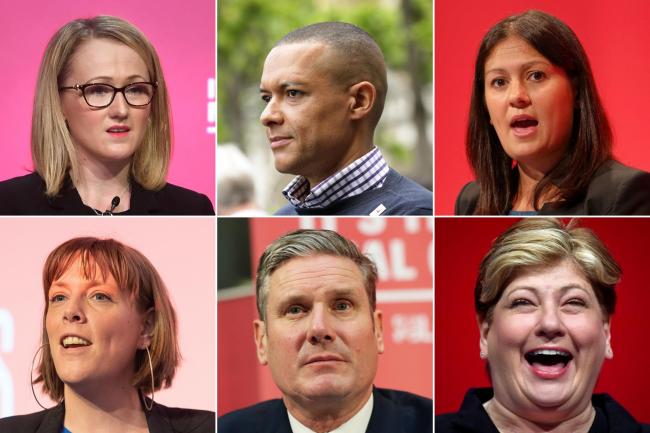

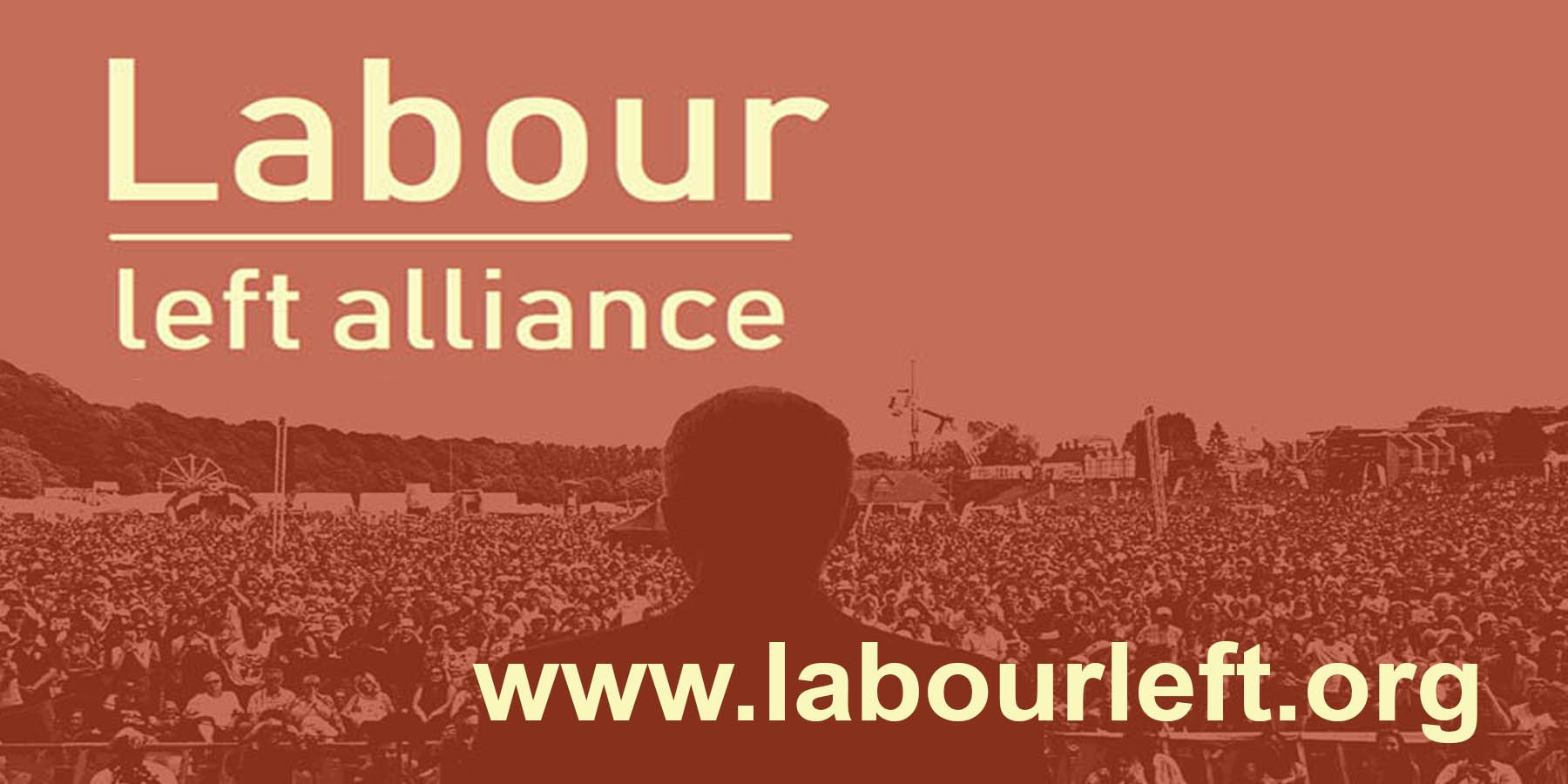
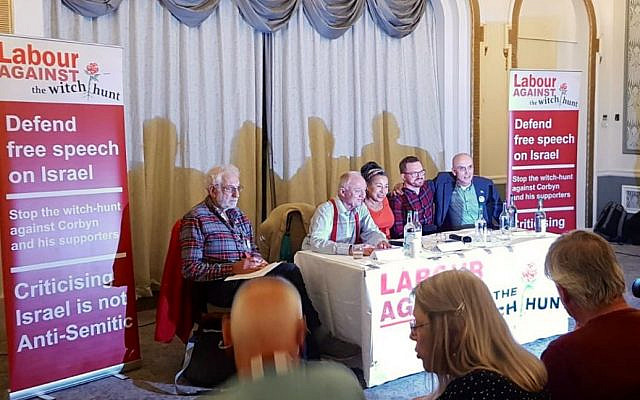 In the run-up to conference, a vicious campaign against the anti-witch-hunt left had led to the cancellation of various venues booked by Jewish Voice for Labour, Labour Against the Witchhunt and the Labour Representation Committee. However, in record time, comrades from the newly established Brighton Labour Left Alliance worked absolute miracles and booked the Rialto Theatre to allow some of the cancelled meetings to take place. They even worked out a programme of ‘Free Speech events’ that went beyond what was planned in the first place. Over three days, they managed to put on a range of exciting events, featuring Chris Williamson MP, Jackie Walker, Kerry Anne Mendoza and others. The venue of LAW’s main fringe event had to be kept secret, but, with almost 200 people attending, it was standing room only. The left showed that it will not be cowed or intimidated.
In the run-up to conference, a vicious campaign against the anti-witch-hunt left had led to the cancellation of various venues booked by Jewish Voice for Labour, Labour Against the Witchhunt and the Labour Representation Committee. However, in record time, comrades from the newly established Brighton Labour Left Alliance worked absolute miracles and booked the Rialto Theatre to allow some of the cancelled meetings to take place. They even worked out a programme of ‘Free Speech events’ that went beyond what was planned in the first place. Over three days, they managed to put on a range of exciting events, featuring Chris Williamson MP, Jackie Walker, Kerry Anne Mendoza and others. The venue of LAW’s main fringe event had to be kept secret, but, with almost 200 people attending, it was standing room only. The left showed that it will not be cowed or intimidated.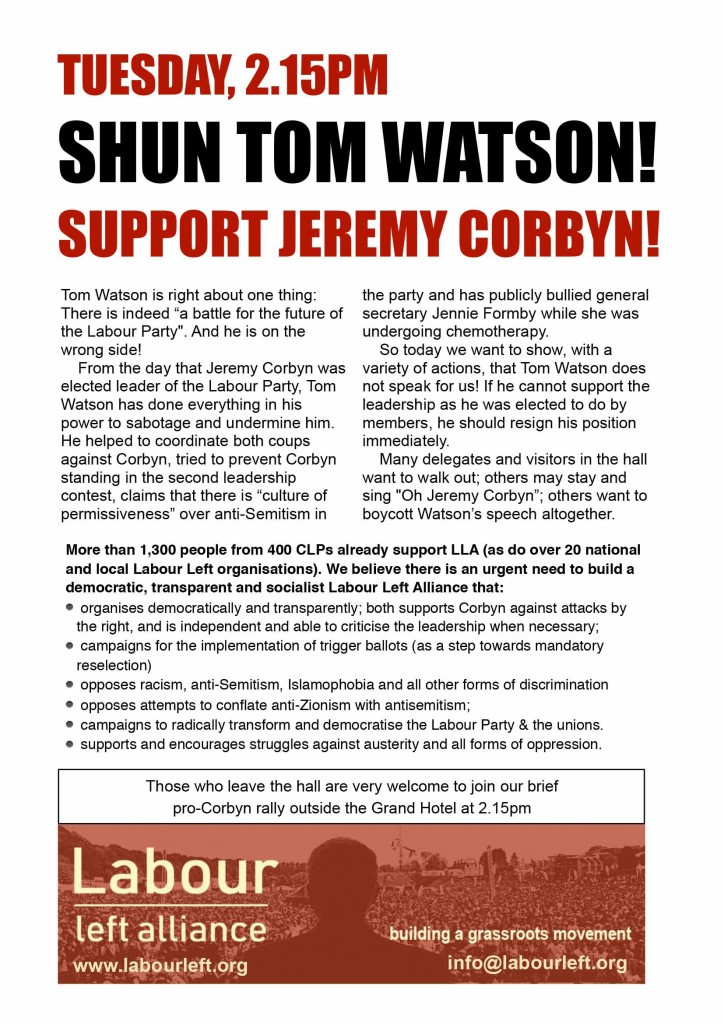 This leaflet explained that a number of delegations were planning to walk out during Watson’s speech, while others were planning to sing “Oh Jeremy Corbyn”. (As an aside, Unite delegates were apparently intending to ‘sit on their hands’ – a rather lame tactic, which, as one sarky commentator at conference put it, “sounds like it could be a Monty Python sketch”.) A WhatsApp group with over 60 people from various delegations and left groups swiftly sprang up during conference and worked closely together to plan for the action. Almost 1,000 copies of a quickly produced LLA leaflet were handed out to delegates and visitors by LLA supporters – and the reception was overwhelmingly positive. Funnily enough, the only negative reaction came from members of (how to say this nicely?) longer established groups on the Labour left, who angrily told us, “unless we can win this, we should not organise such stupid stunts”. Self-defeating attitude or what?
This leaflet explained that a number of delegations were planning to walk out during Watson’s speech, while others were planning to sing “Oh Jeremy Corbyn”. (As an aside, Unite delegates were apparently intending to ‘sit on their hands’ – a rather lame tactic, which, as one sarky commentator at conference put it, “sounds like it could be a Monty Python sketch”.) A WhatsApp group with over 60 people from various delegations and left groups swiftly sprang up during conference and worked closely together to plan for the action. Almost 1,000 copies of a quickly produced LLA leaflet were handed out to delegates and visitors by LLA supporters – and the reception was overwhelmingly positive. Funnily enough, the only negative reaction came from members of (how to say this nicely?) longer established groups on the Labour left, who angrily told us, “unless we can win this, we should not organise such stupid stunts”. Self-defeating attitude or what?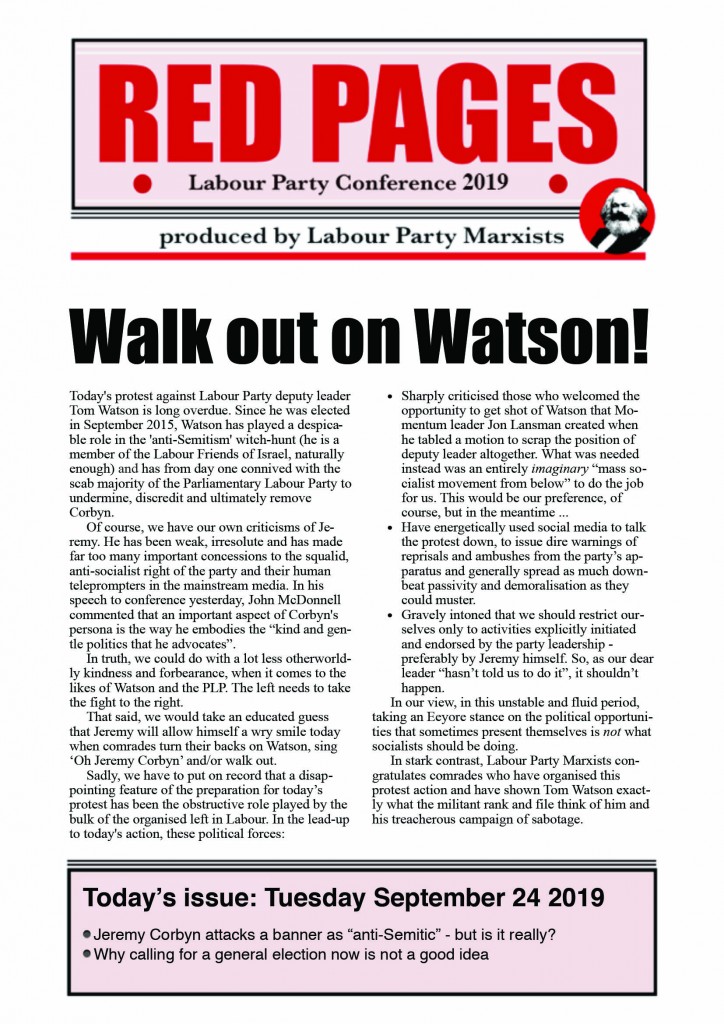 From our interaction with delegates and observers (LPM comrades handed out the LLA leaflet and our daily
From our interaction with delegates and observers (LPM comrades handed out the LLA leaflet and our daily 

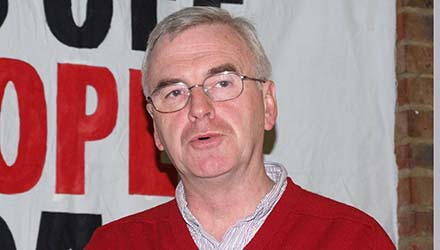
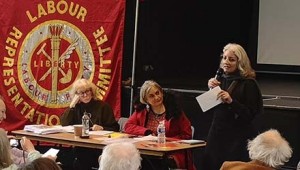 Interestingly, questions from the floor came from a number of comrades who had been targeted, or connected to those targeted, by the Labour bureaucracy in the ongoing ‘Anti-Zionism equals anti-Semitism’ witch-hunt (in relation to which McDonnell claimed the leadership had “implemented reforms”). The vice-chair of South Thanet Constituency Labour Party complained bitterly about the national executive “blocking our candidate”, Rebecca Gordon- Nesbitt. He urged the leadership to “do something urgently” – otherwise the “whole project will collapse”.
Interestingly, questions from the floor came from a number of comrades who had been targeted, or connected to those targeted, by the Labour bureaucracy in the ongoing ‘Anti-Zionism equals anti-Semitism’ witch-hunt (in relation to which McDonnell claimed the leadership had “implemented reforms”). The vice-chair of South Thanet Constituency Labour Party complained bitterly about the national executive “blocking our candidate”, Rebecca Gordon- Nesbitt. He urged the leadership to “do something urgently” – otherwise the “whole project will collapse”.